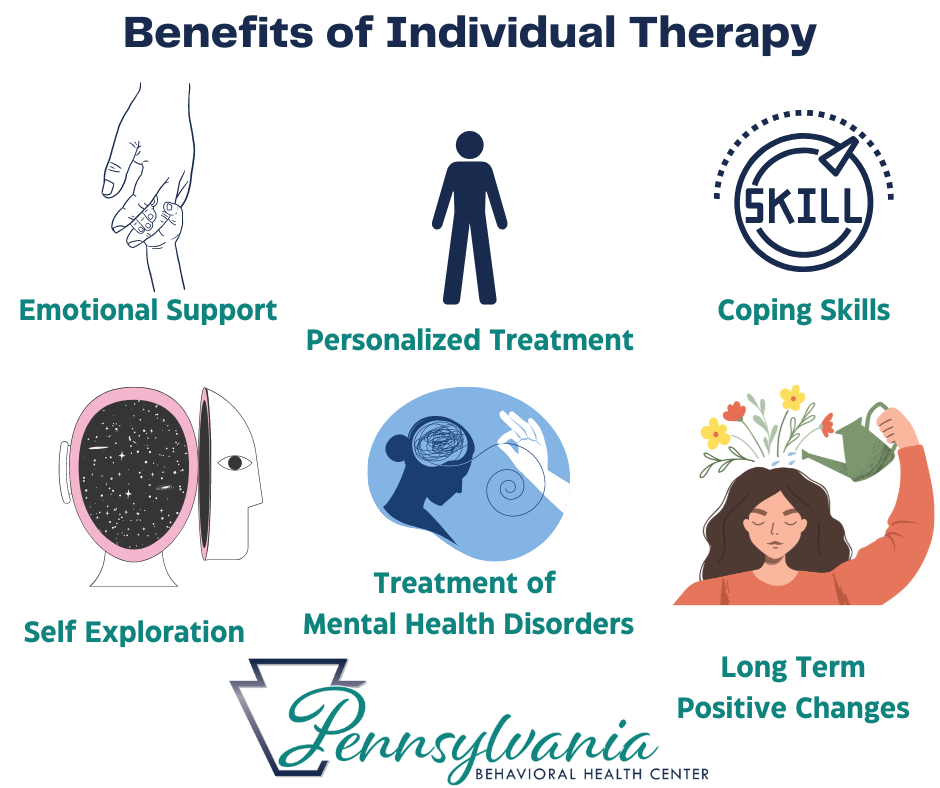A Biased View of Mental Health Counseling
Some Known Details About Mental Health Counseling
Table of ContentsRumored Buzz on Mental Health CounselingMental Health Counseling Fundamentals ExplainedThe Only Guide to Mental Health CounselingMental Health Counseling - An OverviewSome Of Mental Health Counseling
Via treatment, you can get understanding right into your very own patterns of behavior and interaction, which can bring about even more meeting and pleasing connections with close friends, family, and enchanting companions. What we think, we manifest. If you're consumed with adverse feelings and unfavorable thoughts that are hindering your life, therapy can aid., or there are other negative means you behave. Treatment can assist you alter those actions that are having an unfavorable influence on your globe and relationships.

The importance of treatment surpasses your psychological health and wellness. Getting treatment to deal with specific aspects of your life can assist you be much more effective in other locations, including work. Some research study has also shown that there's a direct connection between seeking psychological health and wellness assistance and a decrease in missed work.

Indicators on Mental Health Counseling You Should Know
You can see a specialist when points are going really well in your life, or when you're concerning to experience a large life transition." Talkspace therapist Kate Rosenblatt, MA, LPC, LMHC. There are even much more benefits of treatment than just the ones we have talked about. Treatment can teach you how to manage divorce, take care of despair, or develop partnerships (enchanting or those with family members or buddies) in a healthy method.
For the purpose of the existing research, viewed benefits and obstacles to mental wellness help-seeking are being discovered. Previous study discovered that regarded obstacles have a considerable effect on university student' health behavior options (Von Ah, Ebert, Ngamvitroj, Park & Kang, 2003). Regarded advantages and barriers to help-seeking were specifically selected as a result of their impact on decision-making and ultimately activity (Glanz, Rimer, & Su, 2005).
Today study looks for to take a look at whether or not preconception offers as a barrier to therapy among university student. Eisenberg et al. (2011) recommended that hesitation about therapy effectiveness is an additional obstacle to taking part in therapy. Research study findings exposed that university student endorsed numerous barriers to taking part in treatment. Mental Health Counseling. Amongst these were: (1) liking to deal with psychological wellness issues themselves, (2) not having sufficient time to join therapy, (3) inquiries regarding whether psychological health and wellness treatment is reliable in remediating troubles, (4) a belief that stress and anxiety is typical or the trouble will obtain better without treatment, (5) absence of money, and (6) fret about what others would think if they learnt about therapy engagement.
(2006) reported comparable variables as obstacles to looking for treatment and likewise located that a skepticism of companies might hamper pupils from looking for aid. Team in university psychological wellness facilities might be regarded as hostile, and long wait times for solutions might be "repulsive" for trainees. Aspects facilitating more favorable perspectives are usually at the contrary post of those variables recognized as obstacles.
The Best Guide To Mental Health Counseling
One in 3 (34.6%) reported surviving school and one in 4 (23.3%) reported dealing with moms and dads. Nearly fifty percent of students were associated with campus companies and 1 in 10 reported being in click this a society or sorority. Greater than one-third of trainees (38.1%) reported that they had a member get redirected here of the family or close friend with an identified psychological health problem.

Some Known Facts About Mental Health Counseling.
Univariate F-tests identified particular subscale products that dramatically varied. Ladies were much less likely than males to perceive individuals who go to counseling as psychologically weak, people who go to counseling as crazy, to feel that individuals with psychological health issue ought to manage problems by themselves, that individuals that go to therapy as unable to resolve problems, that individuals who go to therapy are careless, and to feel that people who most likely to therapy are different from typical people in a negative means.
Research results exposed that ladies were considerably much less likely than males to hold stigma-related attitudes. This is consistent with previous research study which also discovered that men hold higher degrees of perceived preconception than ladies (Chandra & Minkovitz, 2006). Based on research findings, it is apparent that males may be much less likely than women to look for treatment because of reduced official statement perceived barriers along with high stigma-related mindsets.
The Best Strategy To Use For Mental Health Counseling
On top of that, college health experts may use curricula targeting men with details on the advantages of psychological wellness therapy and the value of looking for aid when required. All approaches should be assessed with future research study to figure out the impact on university student, especially males. As opposed to basic populace researches which disclose that females are more probable to seek psychological health and wellness services compared to men (Haunstein et al., 2006; Mackenzie, Gekoski, & Knox, 2006), today research study discovered no considerable differences in the number of regarded obstacles to help-seeking actions based upon sex.
This finding was unanticipated and might highlight that those that had obtained counseling had a far better idea of delay times and other "accessibility" barriers that may make it hard to begin therapy. Maybe, participants who have received therapy view much more barriers than participants that have actually not received counseling since looking for counseling services once more could include fear of self-disclosing personal info to a new counselor.